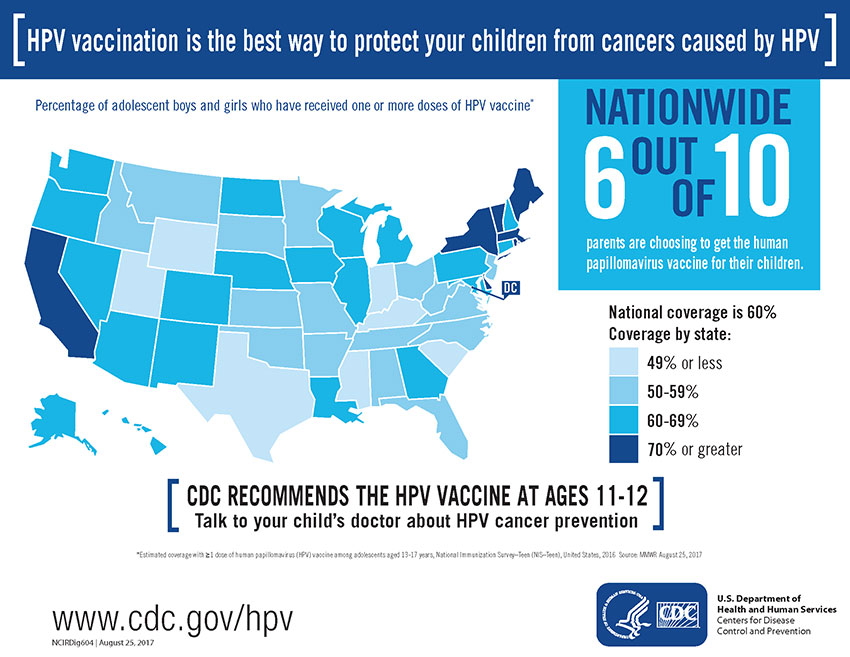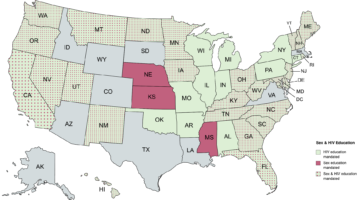The HPV Vaccine is Still Woefully Underutilized—Here’s How We Can Change That
September 4, 2017 by Justin Lehmiller
The human papillomavirus (HPV) is the most common sexually transmitted infection. In addition to genital warts, it has the potential to cause a wide range of cancers, including cancers of the cervix, anus, and throat. A vaccine that can prevent HPV (and its associated cancers) has been around for nearly a decade; however, it continues to be widely underutilized in the United States.
The vaccine is most effective if administered in childhood before sexual activity begins. It is encouraging that, nationwide, a majority of parents—6 in 10—are now opting to have their kids vaccinated. This number has risen steadily in recent years and is at an all-time high. However, it still means that millions of children and adolescents are going without and therefore will be at risk for the potential negative health effects of this virus later in life.
It’s important to note that vaccination rates vary widely across the country. For instance, in some states—like Texas, Indiana, South Carolina, and Kentucky—fewer than half of adolescents have received the vaccine. By contrast, in California, New York, and Massachusetts, more than 70% have received at least one dose (for maximum effectiveness of the vaccine, three injections must be administered a few months apart). For a closer look at how vaccination rates vary across the U.S., check out the figure below created by the CDC.

In order to increase vaccination rates, we need to do a few things. First, we need to combat persistent myths and misinformation, such as the claim that this vaccine poses serious health risks. The truth is that this vaccine is safe and effective, and no riskier than other vaccines [1]. Likewise, persistent concerns have been raised in the media about whether the vaccine will increase rates of risky sexual behavior; however, research has not found any support for that idea either [2].
Second, physicians need better education about the vaccine because it turns out that many of them are engaging in behaviors that are discouraging many teens from receiving it, such as not giving timely vaccine recommendations, failing to recommend same-day vaccination, and only recommending it to those deemed “at risk” [3].
Finally, we also need to get policy makers on board. There’s a lot that states can do legislatively that have the potential to help, such as by creating policies that increase HPV awareness and encouraging vaccination. Efforts to mandate the vaccine have proved controversial; however, if politicians can at least work toward increasing awareness of this infection and reducing barriers to vaccination, that would be a huge step in the right direction.
Want to learn more about Sex and Psychology ? Click here for previous articles or follow the blog on Facebook (facebook.com/psychologyofsex), Twitter (@JustinLehmiller), or Reddit (reddit.com/r/psychologyofsex) to receive updates.
[1] Reiter, P. L., Brewer, N. T., Gottlieb, S. L., McRee, A. L., & Smith, J. S. (2009). How much will it hurt? HPV vaccine side effects and influence on completion of the three-dose regimen. Vaccine, 27(49), 6840-6844.
[2] Smith, L. M., Kaufman, J. S., Strumpf, E. C., & Lévesque, L. E. (2015). Effect of human papillomavirus (HPV) vaccination on clinical indicators of sexual behaviour among adolescent girls: the Ontario Grade 8 HPV Vaccine Cohort Study. Canadian Medical Association Journal, 187(2), E74-E81.
[3] Gilkey, M.B. et al. (2015). Quality of physician communication about human papillomavirus vaccine: Findings from a national survey. Cancer Epidemiology, Biomarkers & Prevention. doi: 10.1158/1055-9965.EPI-15-0326
Image Source: Centers for Disease Control and Prevention (CDC)

Dr. Justin Lehmiller
Founder & Owner of Sex and PsychologyDr. Justin Lehmiller is a social psychologist and Research Fellow at The Kinsey Institute. He runs the Sex and Psychology blog and podcast and is author of the popular book Tell Me What You Want. Dr. Lehmiller is an award-winning educator, and a prolific researcher who has published more than 50 academic works.
Read full bio >


